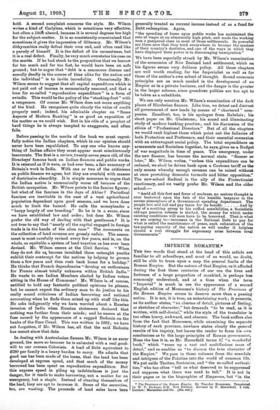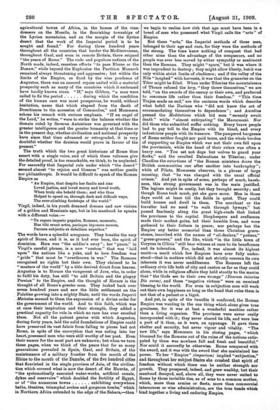IMPERIUM ROMANUM.*
THE two words that stand at the head of this article are familiar to all schoolboys, and most of us would, no doubt, still be able to trace upon a map the general limits of the Roman Empire. But the nature of that Empire, as it affected during the first three centuries of our era the lives and fortunes of a large proportion of mankind, is perhaps less commonly understood, and at a time when the term "Imperial" is much in use the appearance of a second English edition of Momnisen's history of The Provinces of the Roman Empire seems to deserve more than a passing notice. It is not, it is true; an entertaining work ; it presents, as its author states, "no charms of detail, pictures of feeling; or sketches of character," but demands "to be read, as it is written, with self-denial," while the style of the translator is too often heavy, awkward, and obscure. The book Buffett also from the fact that Mornmsen, while examining the separate history of each province, nowhere states clearly the general results of his inquiry, but leaves the reader to form his own conclusions as to time large principles of Roman government. None the less it is, as Mr. Heverfield terms it "a wonderful book," which "sums up a vast and multifarious mass of detail," and so enables us "to discern the true character of the Empire." We pass in these volumes from the scandals and intrigues of the Palatine into the world of common life. We put aside Tacitus, Snetonins, and "the so-called authori- ties." who too often "tell us what deserved to be suppressed and suppress what there was need to tell." It is not in their pages or in the biographies of Emperors, but "in the • The Province, of the Roman Empire. By Theodor Mommaan. Translated. by W. F. Dickson, D.D. New Edition. Itevised by F. Haverfield. 2 vols. London: MacraWau and Co. L215. net.]
agricultural towns of Africa, in the homes of the vine- dressers on the Moselle, in the flourishing townships of the Lycian mountains, and on the margin of the Syrian desert that the work of the Imperial period is to be sought and found." For during three hundred years throughout all the countries that border the Mediterranean, throughout Gaul, and even in remote Britain, there reigned "the peace of Rome." The rude and populous nations of the North made, indeed, ceaseless efforts "to pass Rhene or the Danaw," while beyond the Euphrates the Partbian Monarch remained always threatening and aggressive ; but within the limits of the Empire, as fixed by the wise prudence of Augustus, there was an assured repose united with a material prosperity such as many of the countries which it embraced - have hardly known since. "If," says Gibbon, "a man were called to fix the period during which the condition of the human race was most prosperous, be would, without hesitation, name that which elapsed from the death of Domitianus to the accession of Commodus," and Mommsen echoes his remark with curious emphasis. "If an angel of the Lord," he writes, "were to strike the balance whether the domain ruled by Severus Antoninns was governed with the greater intelligence and the greater humanity at that time or in the present day, whether civilisation and national prosperity have since that time advanced or retrograded, it is very doubtful whether the decision would prove in favour of the present" The truth which the two great historians of Rome thus assert with a single voice, and of which these volumes give the detailed proof, is too remarkable, we think, to be neglected. For assuredly that Imperial rule under which "the desert" seemed almost "to rejoice and blossom" was neither gentle nor philanthropic. It would be difficult to speak of the Roman Empire as
An Empire, that despite her faults and sins
Loved justice, and loved mercy and loved truth, When truly she beheld them; and who thus Helped to speed on, through dark and difficult ways, The ever-climbing footsteps of the world."
Virgil, indeed, in his youth dreamed dreams and saw visions of a golden and Messianic age, but in his manhood he speaks with a different voice :— "Tu regere imperio populos, Romane, memento, Has tibi erunt artes, pacisque inponere morem, Parcere subjeetis et debellare superbos."
The words have a splendid arrogance. They breathe the very spirit of Rome, and it is, as it had ever been, the spirit of dominion. Hers was "the soldier's sway "; her "peace," in Virgil's careful phrase, is a new "custom" that was "laid upon" the nations like a yoke, and to love freedom was " pride " that must be "overthrown in war." The Romans recognised no rights but their own. They claimed to be "masters of the world" by a title derived direct from heaven. Augustus is to Horace the vicegerent of Jove, who, in order to fulfil his duty, has still "to add Britain and the plaguy Persian" to the Empire, and the thought of Horace is the thought of all Rome's greater men. They looked back over seven hundred years and saw the little settlement on the Palatine growing into a mighty State, until the words Imperil Maiestas seemed to them the expression of a divine order for the government of the world. And to this faith, which was at once their inspiration and their strength, they added a practical capacity for rule in which no race has ever excelled them. Not all the patient genius with which Augustus, during forty years, laid the solid foundations of Empire could have preserved its vast fabric from falling to pieces had not Rome, in spite of the correption that was eating into her heart, possessed men who were still worthy of her past. Even their names for the most part are unknown; but when we turn these pages, when we think of the peace that for so many generations prevailed in Spain, Gaul, and Britain, of the maintenance of a military frontier from the mouth of the Rhine to the mouth of the Danube, of the five hundred cities that flourished in the single province of Asia, of the civilisa. tion which covered what is now the desert of the }Taiwan, of "the systematically executed water-works, artificial canals, dykes and reservoirs" which doubled the fertility of Egypt,
or of "the numerous towns exhibiting everywhere baths, theatres, triumphal arches and gorgeous tombs," which in Northern Africa extended to the edge of the Sahara,—then we begin to realise how rich that age must have been in a breed of men who possessed what Virgil calls the "arts" of Empire.
But these "arts," the Imperial methods of these men, belonged to their age and race, for they were the methods of the strong. The time knew nothing of conquest that had other aims than the advantage of the conquerors, and no people was ever less moved by either sympathy or sentiment
than the Romans. They might "spare," but it was where it was imprudent to destroy ; they might allow liberty, but it was only within strict limits of obedience; and if the valley of the Nile "laughed" with harvests, it was that the granaries on the Tiber might be filled. When under Tiberius the mountaineers of Thrace refused the levy, "they threw themselves," we are told, "on the swords of the enemy or their own, and preferred to renounce life rather than their freedom." "This time Trojan made an end," are the ominous words which describe what befell the Dacians who "did not know the art of accommodating themselves to dependence"; and Aurelius penned the Meditations which bid men "serenely await death" while "almost extirpating" the liarcomani. Nor did those who submitted suffer nothing. Every brave people had to pay toll to the Empire with its blood, and every industrious people with its treasure. The pampered burgesses of Rome neither fought nor paid taxes, and the whole burden of supporting an Empire which was not their own fell upon the provincials, while the hand of their rulers was often a heavy one. "You set not dogs but wolves to guard your flocks," said the revolted Dalmatians to Tiberius; under Claudius the extortions of "the Roman ministers drove the British communities one after another into bankruptcy"; while of Pilate, Mommsen observes, in a phrase of large meaning, that "he was charged with the usual official crimes." And yet in spite of some, perhaps of much, harsh- ness, this strong government was in the main justified. The legions might be costly, but they brought security ; and though Rome took much, yet she gave more. Men in those days could at least till the fields in quiet. They could build houses and dwell in them. The merchant or the traveller had no need "to walk through byways," but passed fearlessly along the great high-roads that linked the provinces to the capital. Shopkeepers and craftsmen made their modest gains, led their humble lives, and were gathered to their fathers in peace; nor perhaps has the Empire any better memorial than those Christian grave- stones, inscribed with the names of "oil-dealers," "potters," "green-grocers," and the like, which "in the little town of Coryeus in Cilicia" still bear witness at once to its beneficence and its toleration. For, indeed, it was almost its highest merit—a merit which few Empires have ever fully under- stood—that in matters which did not strictly concern its own interests it was never meddlesome. The Romans left the ordinary civic life both of city and canton as far as they could alone, while in religious affairs they held stoutly to the maxim that "the Gods see to their own wrongs" (Decrrum iniurias Dis curae), and these "negative virtues" were an unmixed blessing to the world. For even in subjection men will work out their own happiness so long as the hand that rules them is not that of a pedant or a bigot.
And yet, in spite of the benefits it conferred, the Roman Empire was wanting in the one thing which alone gives true greatness, for it was at best a wonderful machine rather than a living organism. The provinces were never really incorporated with it; they never shared its life, and were less a part of it than, as it were, an appanage. It gave them shelter and security, but never vigour and vitality. "The new life," says Mommsen in his closing pages, "which bloomed for the Romans out of the ruins of the nations extir- pated by them was nowhere full and fresh and beautiful." Nor could it assuredly be otherwise. Rome conquered with the sword, and it was with the sword that she maintained her power. To her "Empire" (imperium) implied "subjection," and throughout her subject States she crushed that spirit of freedom without which there can be neither strength nor growth. They prospered, indeed, and grew wealthy, but their manhood decayed, and, above all, they were never united to Rome by those invisible ties, as of sons to a common mother, which, more than armies or fleets, more than commercial intercourse or wise administration, are the true bonds which bind together a living and enduring Empire.







































 Previous page
Previous page